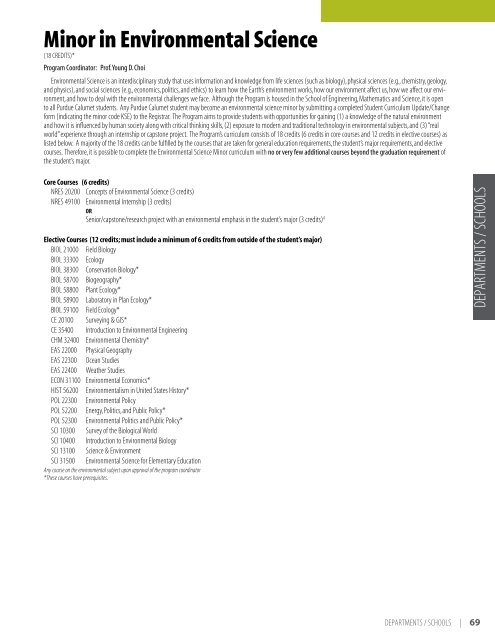Download - Purdue University Calumet
Download - Purdue University Calumet
Download - Purdue University Calumet
You also want an ePaper? Increase the reach of your titles
YUMPU automatically turns print PDFs into web optimized ePapers that Google loves.
Minor in Environmental Science<br />
(18 credits)*<br />
Program Coordinator: Prof. Young D. Choi<br />
Environmental Science is an interdisciplinary study that uses information and knowledge from life sciences (such as biology), physical sciences (e.g., chemistry, geology,<br />
and physics), and social sciences (e.g., economics, politics, and ethics) to learn howthe Earth’s environment works, howour environment affect us, howwe affect our environment,<br />
and howto deal with the environmental challenges we face. Although the Program is housed in the School of Engineering, Mathematics and Science, it is open<br />
to all <strong>Purdue</strong> <strong>Calumet</strong> students. Any <strong>Purdue</strong> <strong>Calumet</strong> student may become an environmental science minor by submitting a completed Student Curriculum Update/Change<br />
form (indicating the minor code KSE) to the Registrar. The Program aims to provide students with opportunities for gaining (1) a knowledge of the natural environment<br />
and howit is influenced by human society along with critical thinking skills, (2) exposure to modern and traditional technology in environmental subjects, and (3) “real<br />
world”experience through an internshipor capstone project. The Program’s curriculum consists of 18 credits (6 credits in core courses and 12 credits in elective courses) as<br />
listed below. A majority of the 18 credits can be fulfilled by the courses that are taken for general education requirements, the student’s major requirements, and elective<br />
courses. Therefore, it is possible to complete the Environmental Science Minor curriculum with no or very few additional courses beyond the graduation requirement of<br />
the student’s major.<br />
Core Courses (6 credits)<br />
NRES 20200 Concepts of Environmental Science (3 credits)<br />
NRES 49100 Environmental Internship(3 credits)<br />
OR<br />
Senior/capstone/research project with an environmental emphasis in the student’s major (3 credits) A<br />
Elective Courses (12 credits; must include a minimum of 6 credits from outside of the student’s major)<br />
BIOL 21000 Field Biology<br />
BIOL 33300 Ecology<br />
BIOL 38300 Conservation Biology*<br />
BIOL 58700 Biogeography*<br />
BIOL 58800 Plant Ecology*<br />
BIOL 58900 Laboratory in Plan Ecology*<br />
BIOL 59100 Field Ecology*<br />
CE 20100 Surveying & GIS*<br />
CE 35400 Introduction to Environmental Engineering<br />
CHM 32400 Environmental Chemistry*<br />
EAS 22000 Physical Geography<br />
EAS 22300 Ocean Studies<br />
EAS 22400 Weather Studies<br />
ECON 31100 Environmental Economics*<br />
HIST 56200 Environmentalism in United States History*<br />
POL 22300 Environmental Policy<br />
POL 52200 Energy, Politics, and Public Policy*<br />
POL 52300 Environmental Politics and Public Policy*<br />
SCI 10300 Survey of the Biological World<br />
SCI 10400 Introduction to Environmental Biology<br />
SCI 13100 Science & Environment<br />
SCI 31500 Environmental Science for Elementary Education<br />
Any course on the environmental subject upon approval of the programcoordinator<br />
*These courses have prerequisites.<br />
departments / schools<br />
departments / schools | 69

















